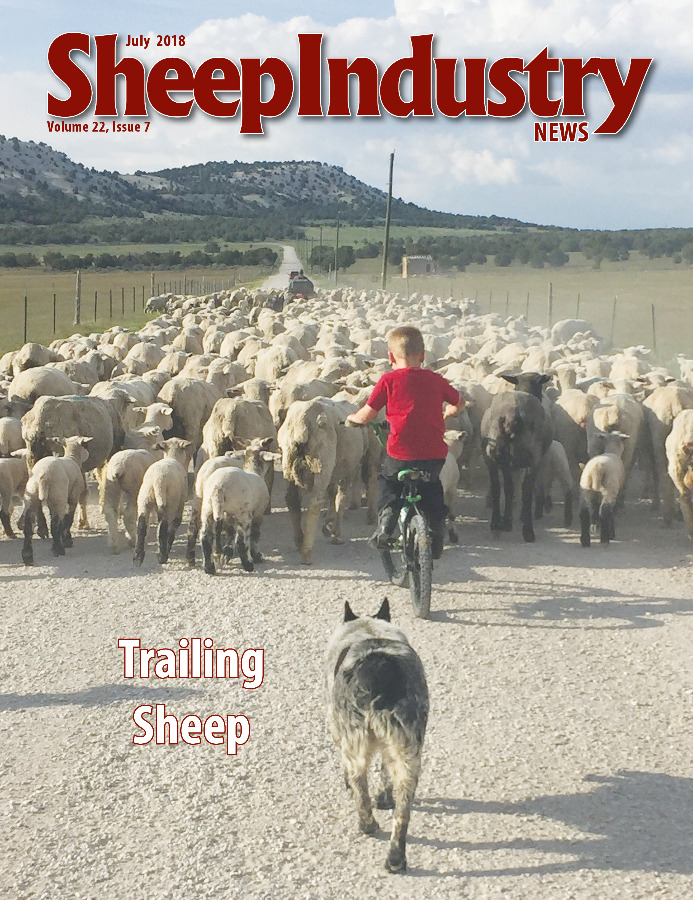KYLE PARTAIN
Sheep Industry News Editor
I recently celebrated three years with ASI, which doesn’t seem like much when you consider that half of our employees have been with the association for a decade. Some of our “more experienced” staff have been here for multiple decades.
As I’ve said in the past, I’m no sheep expert, but I like to think I’ve learned a few things in my time here – most of which won’t exactly be news to experienced sheep producers. Keep in mind that my only sheep experience before coming to ASI was watching mutton busting at rodeos. So, I present:
Kyle’s Top 10 List of Things I’ve Learned From the Sheep Industry
10. All sheep butts look the same, especially when they belong to a western range flock that is running hard in the other direction from my camera because they aren’t used to seeing humans. Someday, I want to take three months off and go live with a flock in the mountains. That way they’ll accept me as one of their own – the way they do their ever-present sheepherders – and I might be able to accomplish my long-term goal of taking a photo as good as those submitted in our annual photo contest.
9. I need my own Border Collie to travel with me and corral such sheep. Wool Marketing Coordinator Christa Rochford’s Border Collie, Charlie, has shown herding tendencies in her suburban backyard. Maybe I can just take him on my next trip. My own dog is more of the guard dog variety – a Bernese Mountain Dog/Great Pyrenees mix that weighs in at 130 pounds and would be exhausted after five minutes of trying to herd sheep.
8. Lamb is pretty tasty. Like many Americans, I’m not sure I’d ever even tried lamb before joining ASI. I might have had a lamb chop somewhere along the way, but not that I remember. Now, lamb shows up on our menu at home at least once a month. I’m also blessed with great lamb dishes on just about every work trip I take. From homemade lamb stew to pre-packaged shredded lamb that made for great barbecue sandwiches to a whole, spit-roasted lamb and even lamb hot dogs, I’ve tried it all in the past three years. I’d be happy to work on improving the average American consumption of lamb if any of our producers want to send free product my way.
7. For that matter, so is mutton. Sure there are certain ways that work best when it comes to preparing this specialty meat, but anyone who’s tried the world-famous mutton barbecue joints in Kentucky will tell you that mutton can be phenomenal.
6. There are two kinds of sheep: wool sheep and hair sheep. Honestly, I had no idea. I’ve visited about a half dozen hair sheep producers in the past three years. But I think the average person will always think of wool breeds when sheep are mentioned.
5. Speaking of wool, it’s a fantastic product with endless uses. Having covered rodeo for so many years, I was mostly a denim/cotton guy when I arrived at ASI in 2015. Now there’s a handful of wool products in my wardrobe. And it’s a rare day when I’m not wearing wool socks.
4. Government policy really does affect the industry. Like the average American, I used to think that a lot of what goes on at state capital buildings and in Washington, D.C., really didn’t affect people all that much. But then I saw how grazing policies on public lands, funding for Wildlife Services, immigrant labor rules and the like can and have taken a drastic toll on sheep producers. From the industry’s perspective, these issues seem so clear, but nothing is black-and-white when politicians and government agencies get involved.
3. Government policy helps the industry. I was just as surprised to learn about programs such as those administered by the Foreign Agriculture Service that help support our industry. More than half of all American wool is exported, and much of that wool is sold thanks to FAS programs administered by ASI that help introduce prospective buyers to the assets of American wool.
2. The Berry Amendment. Never heard of it before coming to ASI, but it assures that our military is working with uniforms and gear that is made in America from American products. That’s why the military is the largest domestic buyer of American wool. Given wool’s fire-resistant qualities and natural breathability in cold or hot conditions, I like to think the military would buy the product even if the Berry Amendment wasn’t in place.
1. I need sheep of my own. Well, that’s what producers keep telling me anyway. Then I’d really learn a thing or two about this industry. After all, there’s no better way to learn than the sink or swim method, right?



